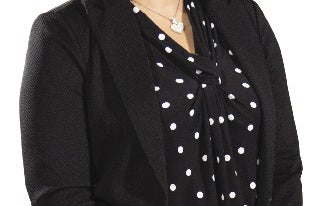Because of systemic oppression, implicit and explicit prejudices and biases, imposter syndrome, and many more challenges very specifically tied to race, many BIPOC people have learned the code of living with the double standards they endure, including how we dress professionally.
Get Instant Access to This Article
Subscribe to Worcester Business Journal and get immediate access to all of our subscriber-only content and much more.
- Critical Central Massachusetts business news updated daily.
- Immediate access to all subscriber-only content on our website.
- Bi-weekly print or digital editions of our award-winning publication.
- Special bonus issues like the WBJ Book of Lists.
- Exclusive ticket prize draws for our in-person events.
Click here to purchase a paywall bypass link for this article.
As a young child, I remember waking up weekdays to the smell of toast browning in the toaster, Folgers Coffee brewing, and my dad’s Ralph Lauren Polo cologne, subtly lingering in the air after he had left for work. Other mornings. I watched him from the doorway as he stood in front of the mirror in my parents’ room, carefully looping and straightening his necktie.
He looked sharp for work, every day. He was always freshly shaved, with a low haircut. Once a week, he would sit patiently looking at his face in a small magnifying, tabletop mirror, for what seemed like hours (but may have only been 30 minutes). He used a sewing pin to meticulously dig out the ingrown hairs on his face. This ritual was reserved for Sunday mornings so the skin irritation that ensued resolved before he had to shave again and head off to work the following morning.
Ingrown hairs can cause inflammation, pain, and tiny bumps in areas where the hair is removed, and it's most prevalent in Black men who shave facial hair, according to the Mayo Clinic. My dad is Black. He would use the sewing pin to remove or uncoil one hair at a time, so that he could shave daily to maintain his clean-cut look. It was tedious and painful, but he endured this for years.
My dad wore a suit and tie to work every day, or at least far more often than he did not, for the entirety of his career. When I was younger, I thought every professional man dressed like this. I love children because of this naivety and innocent world view, their perspectives start very insular and grow daily. We don’t know what we don’t know. It’s intriguing and exciting to watch the growth that comes from diversified experiences.
In the U.S., most working professionals dress in some form of Eurocentric professional attire; I was not wrong about this as a child. This said, a suit and tie everyday is typically reserved for professional men who are in the financial arena, politics, or law, in a more corporate government position. Academics tend to dress much more casually. College professors, like my father, do not generally dress in a suit and tie every day, but rather only for special presentations, unless they are the president or provost. Even in these positions, many lose the tie.
One day as a child, I went to the office with my dad, and as we walked down the long, dark, old architecture-smelling hallway, with white, old men in picture frames along the entirety of the walls (past presidents and trustees) to his office in Salisbury Hall, he peeked his head into a couple of offices to say hello to his colleagues.
I was very curious, and even taken aback, as I observed their attire. As they greeted me, their voices went mute in my head as their mouths continued moving. I could only focus on the Birkenstock sandals, the flannel button downs, and jeans, the Teva sandals and khaki shorts, the unkept longish hair and the stubble beards. These white, male professors were very casually dressed, even sloppily dressed. I was confused. Later that evening, I could have asked my dad about what I had observed, but I was laser-focused on his attire. I asked him, “Dad, why do you wear a suit to work every day?” He responded, “Because I have to.”
It took me many more years after this conversation with my dad to unpack his response. Because of systemic oppression, implicit and explicit prejudices and biases, imposter syndrome, and many more challenges very specifically tied to race, many BIPOC people have learned the code of living with the double standards they endure, including how we dress professionally.
I am not nearly as oppressed by it as I once was, but it is always top-of-mind. My Black, professional husband is more than 30 years my father’s junior, and he very rarely dresses casually for work. He, too, is an educator.
Bonnie J. Walker is the director of equity and inclusion at Worcester Academy. Contact her at bonnie.walker@worcesteracademy.org.

